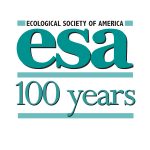ESA receives NSF Award to seed new Network for Next Generation Careers
 For immediate release: Tuesday 15 September 2015
For immediate release: Tuesday 15 September 2015
Contact: Alison Mize gro.asenull@nosila 202.833.8773, ext. 205
The Ecological Society of America, in partnership with the Society for Conservation Biology (SCB), will create a new network of prospective employers, faculty and professional societies over the next eighteen months with a $48,000 grant from the National Science Foundation (NSF). The Next Generation Careers – Innovation in Environmental Biology Education (NGC) incubator project will explore undergraduate college career progression into environmental biology, including fields such as ecology, evolution, conservation, and natural resource management.
“We all know that academia is able to absorb only a limited number of biology graduates. A vast majority of graduates find their way into industry, government, or other applied and non-science jobs,” said Teresa Mourad, ESA’s Director of Education and Diversity Programs and Principal Investigator for the project. “What is not clear is how Biology students are being prepared for these rapidly evolving career tracks in environmental biology with an innovative mindset.”
New groups of professionals will be brought together that include academic faculty, industry, government, and non-profit organization personnel. By working together, the network will develop materials, programs and career development tracks designed for 21st century STEM professionals in environmental biology and inform the broader community of the nature of education and skills that are necessary for future jobs in this ever-changing field. This project addresses the goals and programs of NSF’s Improving Undergraduate STEM Education initiative, particularly the goal of building the professional STEM workforce for tomorrow.
The incubator project activities include surveys of biology department chairs, academic counselors, graduate schools as well as biology faculty and those at the nexus of biology and mathematics. Additionally, an analysis of job postings for entry-level positions in related jobs will seek to identify the most commonly sought skills for graduates with an associate’s or bachelor’s degree. Focus groups at selected disciplinary and professional scientific society meetings will also be organized to gather input.
The results will be presented at a workshop of participants from academia, private sector, government, and non-governmental organizations in the fall of 2016. Implications of the findings for underrepresented populations of students will be underscored.
“Recommendations generated at the workshop will help us establish the network of prospective employers, higher education and professional associations essential to invigorate career preparation programs,” said Geri Unger, SCB’s Executive Director and co-PI on the project. “This will enable us to identify what faculty need to effectively inspire, motivate and mentor new students and build new synergies across sectors to advance Next Generation careers in Environmental Biology and allied fields.”
The Ecological Society of America is the largest professional organization for ecologists and environmental scientists in the world. The Society’s 10,000 members work to advance our understanding of life on Earth, directly relevant to environmental issues such energy and food production, natural resource management, and emerging diseases. ESA works to broadly share ecological information through activities that include policy and media outreach, education and diversity initiatives and projects that link the ecological research and management communities and help integrate ecological science into decision-making. The Society also organizes scientific conferences and publishes high-impact journals. Visit the ESA website at https://www.esa.org.
The Society for Conservation Biology (SCB) is a global community of conservation professionals with members working in more than 100 countries, dedicated to advancing the science and practice of conserving Earth’s biological diversity. SCB’s membership includes resource managers, educators, government, non-government, and private sector staff, students, and policy makers. Our Sections, Chapters and Working Groups work regionally, locally and on issues concerning conservation and religion, freshwater, social science and conservation, and ecological economics and sustainability. SCB hosts the international Congress on Conservation Biology, and regional meetings. Our journals include “Conservation Biology” and “Conservation Letters”, both peer reviewed and high-impact. Visit the SCB website at http://www.conbio.org.